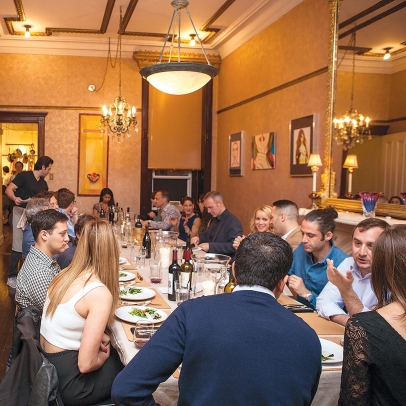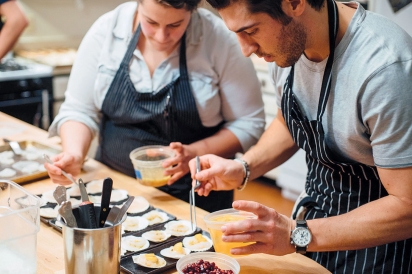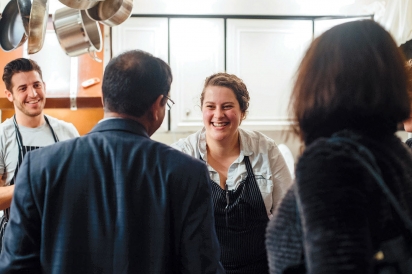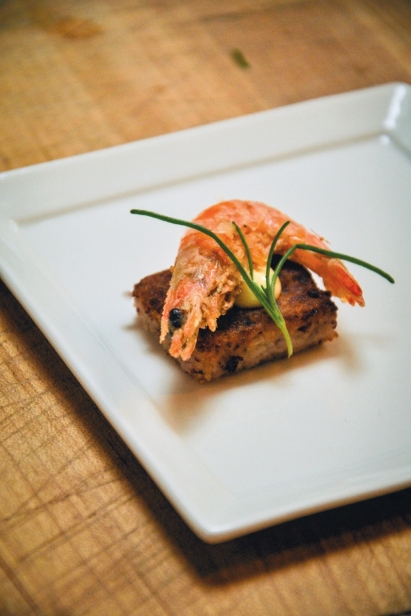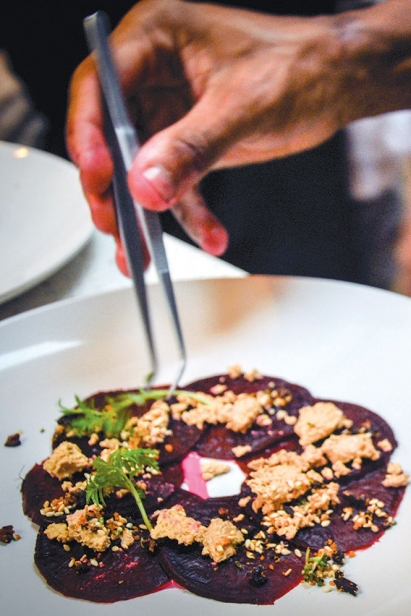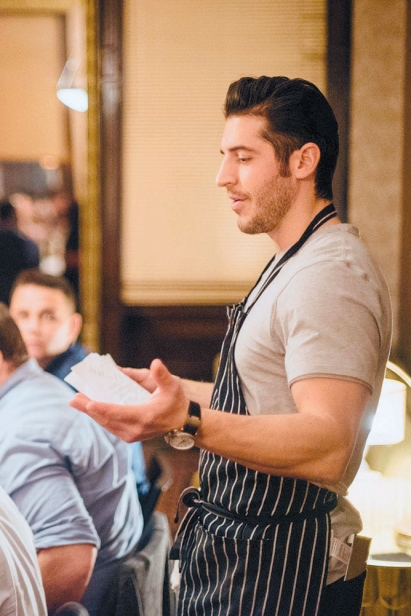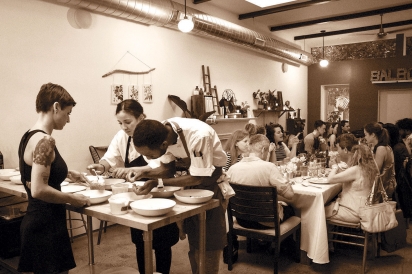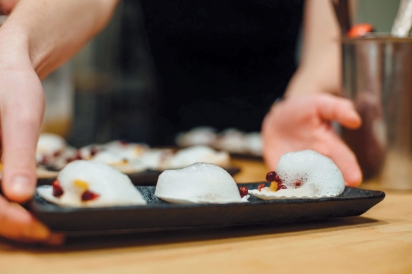Dinner Under the Radar
The woman to my left handed me a bowl of golden dinner rolls. I took one and passed it down the long table, which sat 20 of us. As I broke into the crust and pulled off a corner of the feathery foie gras brioche, the diners around me swooned.
“The butter,” someone gushed. I swiped my bread through a smear of salted chocolate butter and delicately scooped up a bit of juicy apple chutney from my plate. I shared a look of appreciation with the woman next to me. We were dining in a private residence—a high-ceilinged first-floor apartment in Fairmount. The table was set with linen cloths, cork placemats and white lily bouquets.
This seven-course meal wasn’t happening in a restaurant. It was at what’s sometimes called a secret supper club. This is a popup prix-fixe meal served not in a public dining room, but in a private space. Diners are often strangers. A set menu that reflects a chef ’s creative vision discourages substitutions and picky eaters. These semi-legal events operate within the sharing economy, and are often unregulated and unlicensed. They tend to draw adventurous and dedicated food enthusiasts. They like this semi-clandestine world, where the kitchen tweezers of a highend restaurant meet the relaxed vibe of a dinner party.
Supper clubs have recently become more common in Philadelphia. About two years ago, three dinner projects sprung up: Boku, Food Underground and Balboa. They have since given the city’s diners pop-up eating experiences in residential dining rooms and private apartments. Tickets, which average $70 to $80, often sell out within hours. Food-savvy diners find these events by word of mouth or through social media and join mailing lists to make sure they know when the next exclusive meal is announced. Through a food-industry friend, I found my way in to meet the people who gather around the table for dinner under the radar.
The Anti-Restaurant
I encountered the golden brioche roll at a dinner hosted by Boku. Held monthly, it’s a communal meal that turns into a rousing dinner party as guest get to know each other over six or seven plated courses. On a Tuesday evening in March, diners in twos and threes—and a few solo, like me—ventured to the imposing wooden door of an apartment in Fairmount. There was no sign to mark the entrance, no hostess waiting in an alcove. I clutched my bottle of wine and knocked hesitantly.
A slight woman in a neat black dress, the server for the night, welcomed guests, confirming we’d arrived at Boku 34. Over the next 15 minutes, the room filled with a mixed crowd: a few early-30s couples, a family of three, two friends who work in the industry, a few fans of the chef. Clusters formed around pop art on the walls as get-toknow- you chatter developed.
“My house is your house,” Ryan Fitzgerald, creator and host of Boku, said, walking through the dining room in cobalt Nikes and a pinstriped apron. This was the 34th dinner he’d hosted since starting the supper-club project two years ago.
Fitzgerald invited guests through an open door into the retrofitted kitchen to meet Sydney Hanick, full-time line cook at Will BYOB, who stood assembling containers of yolk sauce, sunflower microgreens, and nasturtiums in a neat line at the edge of the counter.
Hanick was at the helm for the night; she had written the menu and would execute it with Fitzgerald acting as her sous chef.
Around seven o’clock, we settled in around the table and introduced ourselves to our dining companions. I was seated between a graphic designer who used to work for a boutique cupcake shop in Manhattan and a student in her final semester at the Restaurant School. The patter of conversation steadied over the first course— beef tartare with caper brine and chives on toast.
A few minutes later, Fitzgerald stood at the head of the table and clasped his hands together. “I’ve been sent out here to buy some time,” he says. I imagined Hanick cringing in the kitchen; it’s a restaurant industry rule not to let the guests know anything is amiss. But Fitzgerald’s candid manner adds to the allure of Boku: Guests are a part of an unscripted evening, welcomed behind the curtain to see what’s usually kept backstage in fine dining.
“Diners are stepping out of the comfort of a restaurant where they know what they’re paying for, know there’s some test the place has passed,” Fitzgerald says. He started Boku two years ago, inspired by an article in the New Yorker about Wolvesmouth—an ultra-exclusive supper club held at chef Craig Thorton’s loft apartment in Los Angeles. At its peak, Wolvesmouth whittled down a waiting list of hundreds to select a varied mix of 16 guests who would relish the performance-art quality of his multi-course meal.
Why couldn’t a similar concept thrive in Philly? We too have a growing group of eager eaters on the hunt for the newest brag-worthy dining experience.
Fitzgerald used vacation days from his nine-to-five in venture capital to host dinners, initially filling seats by luring in friends with free food. As word got out through Instagram, Philly food blogs and Fitzgerald’s email list, Boku dinners started to sell out just hours after they were announced.
Laura Silverman, who works for a cultural grant-maker and lives in Mount Airy, had heard of supper clubs in Manhattan and found Boku online. She was drawn in by the element of surprise, the bold menu and the one-time-only aspect. To enjoy this, she says, “what it takes is adventure and flexibility. You have to go out not knowing what you’re going to get; you have to trust a stranger.”
After molasses ice cream melted into almond cake on our spoons at Boku 34, a gathering formed in Fitzgerald’s kitchen. Guest lingered, asking Hanick questions about the menu and talking with the host about his plans for the next dinner. At the end of the evening, we were left flushed from wine and a feeling of camaraderie. “It’s this community that comes together with this chef and this creativity and then it disperses,” Silverman says. “It felt like a piece of art.”
An Opportunity for Chefs
Supper clubs and pop-ups provide an alternative to the traditional restaurant industry—not only for diners, but for cooks. They’ve been able to thrive as a result of the changing culture among aspiring chefs. The laborious, potato-peeling slow-rise system is dying; these days, young cooks hop around from kitchen to kitchen. “You’re going to learn as much as you’re going to learn from that chef in one year,” Hanick says, who worked at Kensington Quarters and Fork before Will. Alternatives to restaurant dining further expand the arena in which cooks can perform, allowing them to launch their own concepts more easily.
Food Underground founder Ari Miller cooked on the line at High Street on Market before he quit two years ago. He wanted to have a more flexible schedule so he could spend time with family and friends. “I realized I had to choose between that and devoting myself wholly to the line,” Miller says. With a decade of restaurant experience under his belt, he started his own project. He now acts as a sort of guerrilla chef, putting together dinner events all over the city. He describes Food Underground as a “nomadic dinner party.”
One facet of Food Underground is Cooks’ Canvas, a dinner series Miller launched last summer. He recruits line cooks from top Philly restaurants and gives them the opportunity to be the boss for one night. They conceive and execute their menu for a small group of diners.
At the eighth Cooks’ Canvas dinner, I watched Lumumba Uhuru slice beets in an open kitchen facing a long table. “El,” as his friends call him, is a line cook at Fork. Miller introduced him to the 20 guests, some of whom were coworkers, some friends, and a few people he’d never met. “This menu is inspired by the food of my childhood,” Uhuru said, bending his narrow frame forward toward the table.
A few minutes later, he brought out the amuse-bouche—a fried whole shrimp curled atop a polenta cake dabbed with shrimp aioli. “You can just eat it in one bite,” he says. A few of us looked warily from the shrimp’s eyes to Uhuru’s. “Go ahead, El, show them how you eat the whole shrimp,” Miller says. Uhuru popped it in his mouth, shrugged his shoulders, and we followed suit.
The menus at these events are daring on purpose. It’s a big chance for an ambitious young chef to show off his or her culinary expertise. A few components listed on the menu at Uhuru’s Cooks’ Canvas were unfamiliar to me. There was the bottarga, Italian cured fish roe served with cacao nibs and caramelized yogurt atop coffee-roasted beets. I’d never encountered bottarga, and who knew yogurt could be caramelized? As the courses were served, Uhuru explained the inspiration for each dish. He was trying out some recipes for the first time and, as diners, we were part of the experiment. It was a meal and a culinary education.
A Culinary Community
Finding space to host events like Cooks’ Canvas is a challenge. Outside the private apartment, venues can be expensive and are often ill equipped. Uhuru’s dinner was held at Balboa, a kitchen and dining space in Kensington available for chefs to rent. Alex Garfinkel, who’s cooked at Le Bec-Fin, Lacroix, Morimoto and Amada, founded Balboa after starting A&G catering and his own supper club.
Balboa is becoming a culinary hub, providing chefs with a space to host their dinners as well as access to top food purveyors. “It’s a stepping stone to bring more chefs in contact with local growers and artisans,” Garfinkel says.
The one-night-only nature of the supper club means that chefs can shop last-minute, and since they’re cooking in relatively small quantities, they can more easily source locally. “Every time I’m working with a new chef, we talk about our sourcing,” Garfinkel says. He’s well connected with area farmers; before he opened Balboa, he hosted his supper clubs at Red Hill Farm in Aston and Green Zebra Farm in Gradyville. He wrote menus that featured ingredients at the peak of their season and offered discounts to the farms’ CSA members.
When he’s cooking at Balboa, Garfinkel gets ingredients from Heritage Farm, Ploughshare Farm, and the Fair Food Farmstand—to name a few. One of his favorite courses to serve features honeynut squash (a baby butternut variety) cut in half and roasted, its carvedout center filled with a pool of savory goat-milk yogurt. “We don’t do a lot of simple, three-ingredient dishes,” he says, but high-quality local products can often stand alone.
Garfinkel sees Balboa as a part of a greater team effort to celebrate local food. “It’s a movement,” he says, “a different way to nourish yourself by going out and supporting your local community.”
These dinner projects are thriving, in part because food fascination supplies plenty of eaters eager for the newest, exclusive meal. This might be what gets guests to buy tickets, but what truly captures their attention is the heart behind these events.
Hanick woke up early on her day off to make brioche dough for Boku 34. Fitzgerald uses his vacation days to wash dishes and clean his apartment the day after his dinners. Miller schleps his 10-pound knife kit and huge tote bags full of ingredients from kitchen to kitchen throughout the city. Garfinkel takes time to advise farmers on smarter ways to grow ingredients for chefs.
Each time they host a dinner, it’s a different menu with a new crew of helpers; by necessity, there’s more energy put into the whole production— and diners can feel it.
These events provide more than a meal: They fulfill a need to slow down and connect with a community in our exceedingly convenience- oriented culture. The service is relaxed, yet professional; menus are dazzling, though experimental; you may not know the person sitting next to you, but by the end of the night you might just be swapping sips of wine.
Boku—To find out about upcoming dinners go to Boku Supper Club and request an invite.
Food Underground—Keep tabs on upcoming events.
Balboa—Visit their website to see upcoming events and subscribe to the email list.
PHOTOGRAPHS: COURTESY OF BOKU, FOOD UNDERGROUND AND BALBOA


